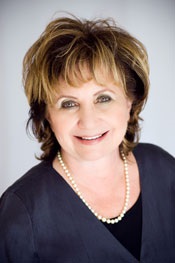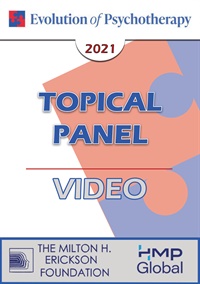EP21 Topical Panel 08 - Resistance - Robert Dilts; Nancy McWilliams; Michael Miller; Cloe Madanes
- Average Rating:
- Not yet rated
- Topic Areas:
- Topical Panels | Cognitive Psychology | Motivation | Neuro-Linguistic Programming (NLP) | Psychoanalysis | Resistance | Strategic Therapy
- Categories:
- Evolution of Psychotherapy | Evolution of Psychotherapy 2021 | Pioneers in Couples and Family Therapy
- Faculty:
- Robert Dilts, BA | Nancy McWilliams | Michael Miller | Cloe Madanes, HDL, LIC
- Course Levels:
- Master Degree or Higher in Health-Related Field
- Duration:
- 1 hour
- Format:
- Audio and Video
- Original Program Date:
- Dec 05, 2021
- License:
- Never Expires.
Description
Description: This panel explores diverse perspectives on resistance in therapy, featuring insights from leading experts. Dilts focuses on the relational aspect of resistance, while McWilliams draws from psychoanalytic theory to stress nonjudgmental responses. Miller explains how motivational interviewing reframes resistance as sustained talk and discord. Madanes offers a case study on using family dynamics to reduce resistance. The panel also addresses how COVID-19 has shaped client engagement and resistance in therapeutic settings.
Syllabus Description: Clients generally understand what they need but fail to comply with their own directives and those of the therapists. Resistance will be analyzed from three different therapeutic models.
Learning Objectives
- Describe resistance from each of the three models
- Given the patient, indicate three possible orientations to the client resistance
Credits
Handouts
| Ericksonian Learning Snapshot (244.3 KB) | 2 Pages | Available after Purchase |
Faculty

Robert Dilts, BA Related Seminars and Products
Robert Dilts, has been a developer, author, trainer and consultant in the field of Neuro-Linguistic Programming (NLP) - a model of human behavior, learning and communication - since its creation in 1975 by John Grinder and Richard Bandler. A long time student and colleague of both Grinder and Bandler, Robert also studied personally with Milton H. Erickson, M.D., and Gregory Bateson.

Cloe Madanes, HDL, LIC Related Seminars and Products
Cloé Madanes, HDL, LIC, is a world-renowned innovator and teacher of family and strategic therapy and one of the originators of the strategic approach to family therapy. She has authored seven books that are classics in the field: Strategic Family Therapy; Behind the One-Way Mirror; Sex, Love and Violence; The Violence of Men; The Secret Meaning of Money; The Therapist as Humanist, Social Activist and Systemic Thinker; and Relationship Breakthrough. She has presented her work at professional conferences all over the world and has given keynote addresses for The Evolution of Psychotherapy Conference, the American Association of Marriage and Family Therapy; the National Association of Social Workers, The Erickson Foundation, the California Psychological Association and many other national and international conferences. Madanes has won several awards for distinguished contribution to psychology and has counseled outstanding individuals from all walks of life.


